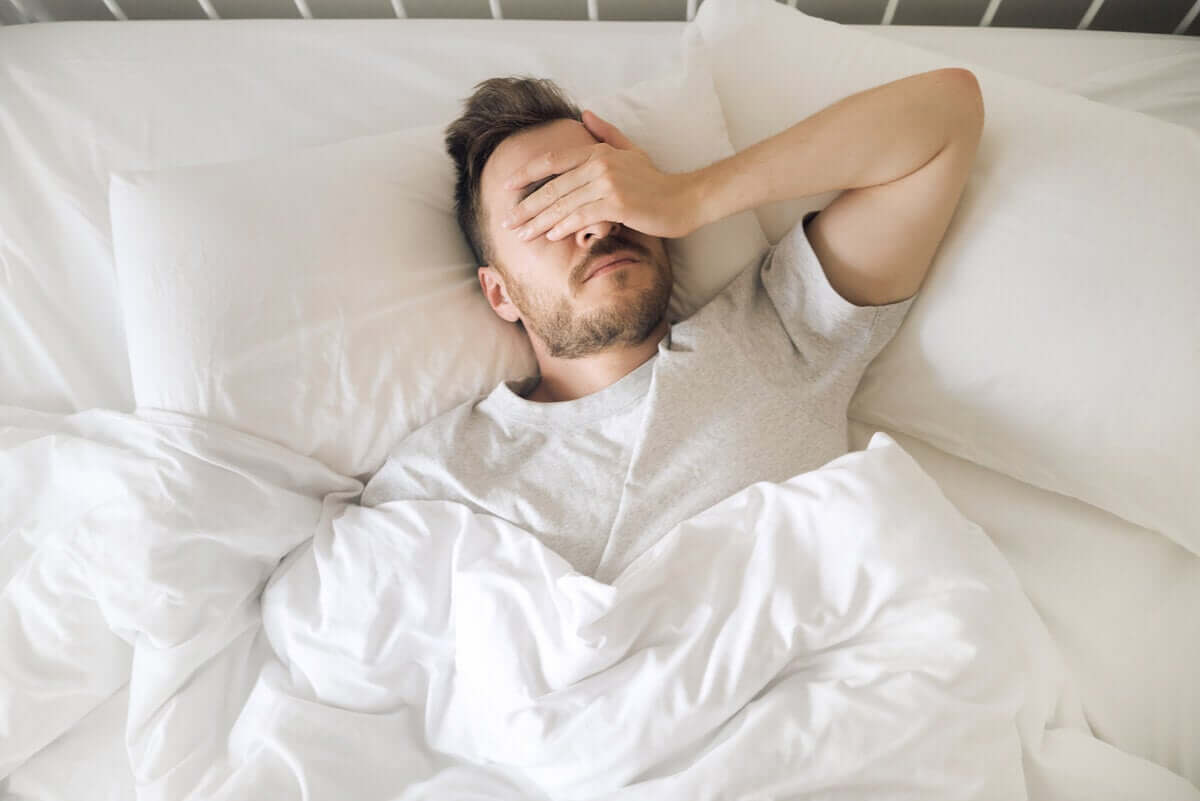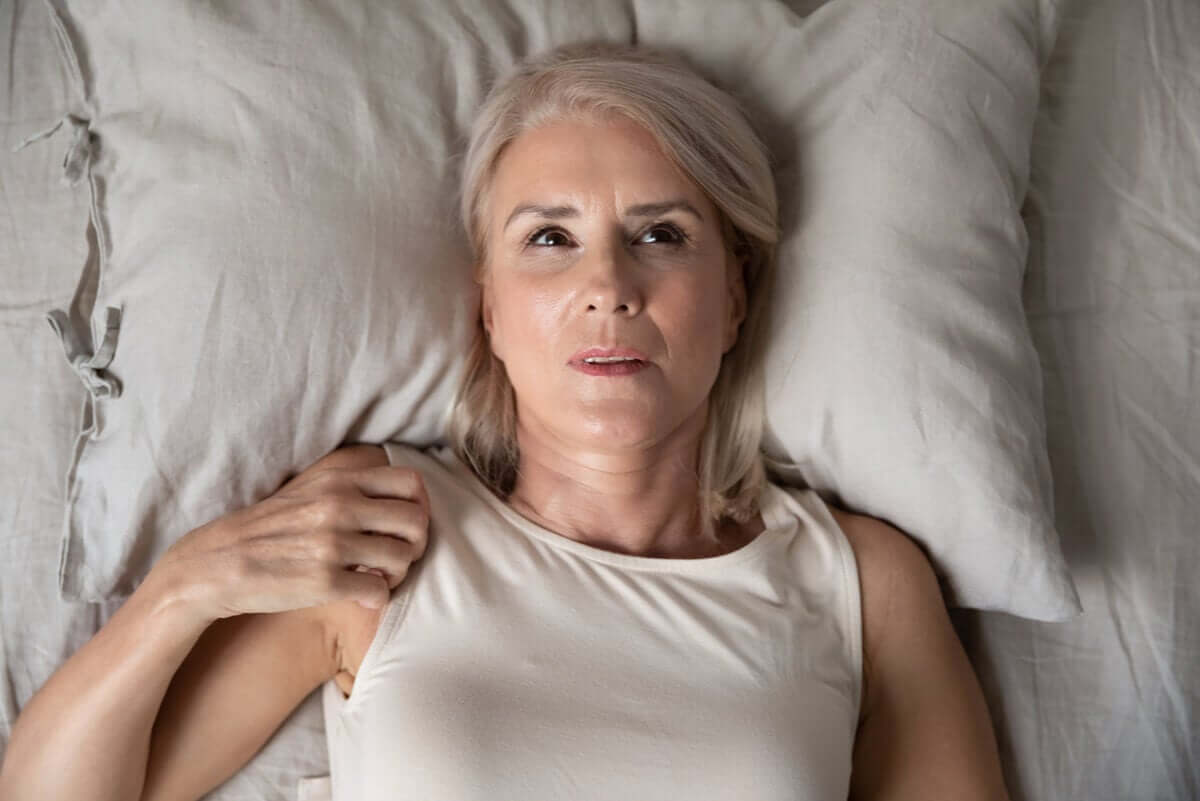Anxiety at Night: Symptoms, Causes, and Treatment


Written and verified by psychologist Valeria Sabater
Problems falling asleep, a mind that won’t stop coming up with worries, sweating, increased heart rate, a choking sensation… Anxiety at night is more frequent than you may think. So much so, that it might be behind recurrent insomnia that cuts down on your quality of life.
It’s important to know that a significant part of sleep disorders is directly related to states of anxiety. Therefore, when nighttime comes along and you want to get a good night’s rest, all too often, we get just the opposite.
Thus, conditions like generalized anxiety disorder or even post-traumatic stress syndrome are clear triggers of the bad nocturnal rest. Moreover, something that usually happens is the following: The nervousness and anguish increase when the night arrives.
We internalize much of the physiological and emotional excitement that we accumulate during the day into a state of nocturnal hyperactivity. Therefore, it’s very common to suffer an anxiety attack in the early morning, for example.

Anxiety at night: The hidden manifestation of a problem
We define nocturnal anxiety as that state of hyperactivation and alert response that interrupts your rest in the middle of the night. This alteration frequently appears in people who suffer from feelings of worry, restlessness, and anguish for months on end.
At the same time, it’s common, to notice alterations in our sleep cycles in these situations. In the same way, it’s also common to get into bed at night and get lost in the labyrinth of thoughts, thus feeding the cycle of anxiety.
It won’t surprise you to know, therefore, that a good part of those who suffer from insomnia often display marked anxiety that often goes untreated.
For example, we can look at studies like that Doctor Luc Staner of the Rouffach Hospital (Maryland, United States) carried out. Their research indicates that the prevalence of anxiety among those who suffer sleep disorders could between 24% and 36%.
The figure is high enough for us to consider the seriousness of the problem. After all, we mustn’t forget that chronic poor nocturnal rest can contribute to the development of various diseases.
What are the symptoms of anxiety at night?
One of the main symptoms that those who suffer from nocturnal anxiety experience is hyperactivation. It’s not only that your mind seems to be more willing to let itself be carried away by the drift of worry. Also, your body, although exhausted, accumulates tension, as if you were prepared to escape or to launch yourself into a race.
Also, the following signs are common:
- It’s common for individuals to experience tachycardias, pressure in the chest, and the sensation of drowning.
- Headaches or pinpricks in the temples are also frequent.
- The person can take hours to fall asleep and, when they finally do, they still wake back up frequently.
- Nocturnal anxiety involves the feeling of not having rested. That’s because they have a hard time reaching the REM (rapid eye movement) stage of the sleep cycle. REM sleep is essential when it comes to sleeping deeply and being able to perform certain tasks. For example, the processing of information, learning, and the consolidation of the memory.
- Lack of REM sleep further intensifies emotional distress, which increases one’s anxiety.
- At the same time, there’s an important detail to keep in mind: When the disorder reaches high levels, the person may suffer an anxiety attack.
You might also be interested in: 9 Habits that Cause Anxiety
Which are the causes of anxiety at night?
Mariano Chóliz, professor at the University of Valencia, has conducted interesting research work on anxiety and sleep disorders. In it, he talks about what’s known as Monroe’s hypothesis (Monroe, 1967). According to this approach, the origin of nighttime anxiety could have to do with the following:
- People who suffer from this condition are characterized by a higher degree of physiological activation (arousal, according to the technical term used in neuronal physiology). They suffer from a higher breathing frequency, a higher body temperature, as well as more intense muscular tension.
- Added to this symptomatology, we can also highlight cognitive factors (negative thoughts and worries) and the emotions (anguish, fear). All of this creates that symptomatic triangulation that intensifies anxiety at night.

What does the treatment of nighttime anxiety involve?
Anxiety and the associated insomnia are only symptoms of an underlying problem. Therefore, there’s no point in resorting to relaxing infusions or even pharmaceuticals for sleeping if we don’t address the origin of the disorder.
Hypnotic or soporific drugs will allow us to fall asleep, but they’re not the solution. What’s the most effective strategy in these situations? Psychological therapy, either to address the trigger of the situation or to offer us skills with which to improve quality of life.
Therefore, now we’ll look at what you should take into account to reduce nighttime anxiety:
- Identify the environment, life habits, and situations that may play a role in the situation.
- Obtain a proper diagnosis: A specialist must determine what kind of anxiety the patient suffers from.
- On average, cognitive-behavioral therapy is the most appropriate in these cases.
- It’s necessary, in turn, to always follow the same schedules within your routine. In other words, you should go to bed and get up at the same time every day.
- Relaxation and deep breathing exercises are also a good idea.
- Experts recommend restricting the use of cell phones, computers, and other electronic devices two hours before going to bed.
- Avoid eating food with sugar before going to bed, since it can promote brain activation, due to glucose.
Find out more: Insomnia Disorder: Causes and Treatment
Don’t let nighttime anxiety progress
Finally, there’s one last aspect to highlight. It’s never a good idea to allow these situations to persist. Allowing your nighttime anxiety and insomnia to go untreated produce harmful changes in your body. It reduces your health and seriously affects your quality of life.
Therefore, see a professional as soon as possible to normalize your sleep patterns and get the rest you need.
All cited sources were thoroughly reviewed by our team to ensure their quality, reliability, currency, and validity. The bibliography of this article was considered reliable and of academic or scientific accuracy.
- Coren, S. (1988): Prediction of insomnia from arousability predisposition scores: scale development and cross-validation.
Behaviour Research and Therapy, 26, 415-420. - Coyle, K. y Watts, F.N. (1991): The factorial structure of sleep dissatisfaction. Behaviour Research and Therapy, 29, 513-520.
- Chóliz, M. (1994): Cómo vencer el insomnio. Madrid: Pirámide.
- Chóliz, M. (1999). Ansiedad y trastornos del sueño. En E.G. Fernández-Abascal
y F. Palmero (Eds.): Emociones y Salud (pp. 159-182). Barcelona: Ariel. - Cox, R. C., & Olatunji, B. O. (2020, June 1). Sleep in the anxiety-related disorders: A meta-analysis of subjective and objective research. Sleep Medicine Reviews. W.B. Saunders Ltd. https://doi.org/10.1016/j.smrv.2020.101282
- Haynes, S.N.; Adams, A.E. y Franzen, M. (1981): The effects of pre-sleep stress on sleep-onset insomnia. Journal of Abnormal Osychology, 90, 601-606.
- Panameño, Andrea Cortes, et al. “Dormir o no dormir… no es un dilema: La falta de sueño es causa de la obesidad y diabetes.” Contactos, Revista de Educación en Ciencias e Ingeniería 112 (2019): 40-48.
- Antón, Alejandra. “Tratamiento cognitivo-conductual en un niño con ansiedad a la hora de dormir.” Revista de Psicología Clínica con Niños y Adolescentes 1.1 (2014): 37-43.
- González, MA Álvarez-Mon, and F. Ortuño. “Tratamiento del insomnio.” Medicine-Programa de Formación Médica Continuada Acreditado 12.23 (2016): 1359-1368.
- Medina-Chávez, Juan Humberto, et al. “Guía de práctica clínica Diagnóstico y tratamiento del insomnio en el adulto mayor.” Revista Médica del Instituto Mexicano del Seguro Social 52.1 (2014): 108-119.
- Mellman, T. A. (2008, June). Sleep and Anxiety Disorders. Sleep Medicine Clinics. https://doi.org/10.1016/j.jsmc.2008.01.010
- Taylor, D. J., Lichstein, K. L., Durrence, H. H., Reidel, B. W., & Bush, A. J. (2005). Epidemiology of insomnia, depression, and anxiety. Sleep, 28(11), 1457–1464. https://doi.org/10.1093/sleep/28.11.1457
- Yakupov, E. Z., & Troshina, Y. V. (2016). Anxiety, insomnia, depression — In conjunction with or opposite to functional disorders. Zhurnal Nevrologii i Psihiatrii Imeni S.S. Korsakova. Media Sphera. https://doi.org/10.17116/jnevro201611651119-12
This text is provided for informational purposes only and does not replace consultation with a professional. If in doubt, consult your specialist.








